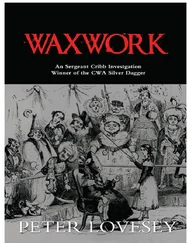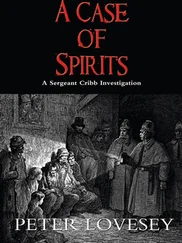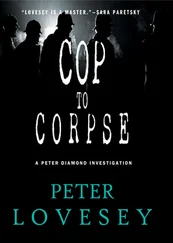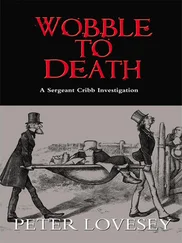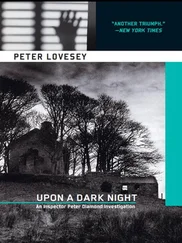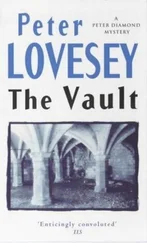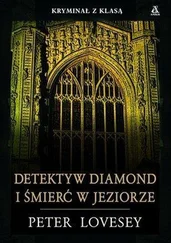‘But you’re quite certain that she isn’t responsible for what happened tonight?’
‘Well, you saw the state she was in after she had rescued Beaconsfield, Sergeant.’
‘Quite so.’ Cribb got to his feet. ‘We’ll leave you to get some rest now. You’ll be feeling the effects of tonight’s experience. There’s nothing we can do for you before we go? Very good. There’s just one thing I want you to do for me, then. Whatever happens in the next day or two—and I suspect that something may—avoid violence. Scotland Yard won’t be far behind you.’
With that, Cribb picked up his hat and cane and quit the room. Thackeray hauled himself out of his comfortable chair, mystified by the sergeant’s last remark. Violence? He looked hard at Albert; what kind of violence was a bed-ridden man capable of, even if he was the Hercules of Rotherhithe? He followed, shaking his head.
 THERE WAS A TAP at the door of the interview room at Kennington Road Police Station. Sergeant Cribb rubbed his hands in anticipation. ‘It had better be Cadbury’s,’ he told Thackeray. ‘Come in!’
THERE WAS A TAP at the door of the interview room at Kennington Road Police Station. Sergeant Cribb rubbed his hands in anticipation. ‘It had better be Cadbury’s,’ he told Thackeray. ‘Come in!’
A bright-eyed constable in full uniform with helmet, greatcoat and armlet, made his entrance.
‘Lord, they get younger and younger,’ muttered Cribb. ‘You can put the tray down here, lad. What’s your name?’
‘Oliver, Sergeant.’
‘And how long have you been in the Force?’
‘Four months, Sergeant.’
‘Is that so? That’s a fine new uniform you’re wearing, Oliver, but there’s no need to dress up to bring us a cup of cocoa, you know.’
‘I’m on night duty, Sergeant, and Sergeant Flaxman insists—’
‘Does he now? It’s not for me to interfere, then. You’re on till six tomorrow morning, are you?’
‘Yes, Sergeant.’
‘And you’re the man whose beat takes in Little Moors Place?’
‘Yes, Sergeant.’
‘Then listen to me, young Oliver. I want you to keep a special watch on that road tonight—number nine in particular. You may know it—theatrical lodging-house. Just as soon as anyone enters there, it’s your job to hare back here and let Constable Thackeray know. You can stand at the end of the road: it’s a one-ender, you know, so you should be able to keep out of sight. Pity you’re not a plain-clothes man, but we’ll have to make do with you. Keep your lantern out; there’s nothing like a bull’s-eye for giving a bobby away. And take that armlet off when you get there.’
‘But Sergeant—’
Cribb put up his hand. ‘I’ll square it with Harry Flaxman. This is a chance for you to make a name for yourself, lad, so don’t disappoint me. Here, let’s have a look at that armlet of yours. See that, Thackeray. What do you make of that?’
‘Soda, Sarge, without a doubt.’
‘Unmistakable. Never wash your armlet in soda, young Oliver. Makes the colour run like you’re going to run back here from Little Moors Place as soon as you’ve got any news for us. That’ll do, then. Fine cup of cocoa!’ He turned back to Thackeray, as P.C. Oliver left to begin his vigil. ‘You can relieve him at six. I don’t think anything’ll happen before then, but I can’t take the chance. Well, Thackeray, I know the symptoms. Your face has been as long as Big Ben all evening. You want to speak your mind to me. Very well. Now’s the time. Just wipe the cocoa-skin off your moustache and I’ll give you my complete attention.’
‘Well, Sarge,’ said Thackeray a moment later, ‘I suppose it’s just that I can’t take all this music hall stuff seriously. It don’t seem nothing like your class of investigation to me. It’s not really worthy of you, Sarge. A blooming bogus bulldog in a basket and a strong man with a twisted ankle—that don’t seem worth losing a night’s sleep over. We’ve taken on some odd cases, I know, but there’s always been a corpse to make the whole thing worth while.’
‘You might have got one tonight if that dog had rabies,’ said Cribb. ‘I understand you, though. On the face of it, tonight’s affair at the Grampian seems pretty small beer. But look at it as the latest episode in this string of accidents on the stage—and remember we had a warning that something would happen tonight—and it becomes a deal more sinister. What we saw at the Grampian certainly wasn’t murder, Thackeray, but from Albert’s viewpoint it was professional assassination. You heard him yourself saying he was finished as a strong man. We heard Woolston saying something similar in Newgate. That’s serious enough for me, Constable.’
Thackeray admitted that it was.
‘Let’s recall the incidents,’ continued Cribb, reaching for a sheet of paper. ‘I’ll list them here. First there was the collision of the Pinkus sisters on their shortened trapezes; then Bellotti’s tumble from the greasy barrel; the shameful alterations to Sam Fagan’s song-sheet; the accident to the sword-swallower; the unspeakable calamity suffered by Miss Tring; and the sword through the leg of Woolston’s assistant. And now Albert’s attack by a fraudulent bulldog. What do they have in common, would you say?’ He handed the list to Thackeray and returned to his cocoa.
‘I’ve given this a lot of thought, Sarge, because I expected you to ask me sooner or later.’
‘Good. What conclusions d’you draw, then?’
Thackeray drew a deep breath. ‘I haven’t been able to conclude anything, Sarge. The more I think about it, the more ridiculous it all seems.’
To his amazement Cribb pitched forward, laughing. ‘Thackeray, you’re incomparable! I knew you wouldn’t fail me. Of course it seems ridiculous, man! That’s the point of it all!’
‘The point?’
‘Damn my eyes, you still don’t see it! The common element, Thackeray, is ridicule. Absurdity. There’s no better way to ruin a serious performance on the stage. Imagine your precious Irving falling through the stage-trap in the last act of The Bells. He’d be finished! Just as Albert was finished when the bulldog bit him tonight. Can you see a music hall audience ever taking him seriously again? Of course they won’t. As soon as he appears anywhere you’ll hear barking and growling all over the theatre. Ridicule, Thackeray—it’s a devastating weapon.’
Thackeray agreed, drawing comfort from the private thought that a man of Cribb’s stamp ought to know more about the offensive use of ridicule than he did. ‘So somebody plans to make laughing-stocks of all these performers, Sarge. Then we’re looking for someone with a grudge against each one of them. Shouldn’t we interview ’em all to find out who they’ve fallen out with in recent months?’
‘And find one common name? That’s what I thought until I tried tracing them. Do you know, Thackeray, they’ve all quit their lodgings and disappeared except Woolston? At least he won’t find it easy to do a flit from Newgate.’
‘Why should they all do that, Sarge?’
‘Could be they can’t afford the rent any more, being out of work,’ said Cribb. ‘It’s cheaper in a common lodging- house. That’s where half the missing persons in London are, in my opinion. It’s no use asking the keepers who they’ve got under their roofs, when their only obligation is to report infectious diseases and limewash the walls and ceilings twice a year. Yes, that’s where they could very well be. For all the spangles and champagne, your music-hall artiste is just a step from the poor-house.’
‘Didn’t they leave forwarding-addresses?’ suggested Thackeray, on an inspiration.
‘I had the same thought,’ said Cribb, ‘but it seems you don’t do that in the theatre. You move around so much that you use your agent’s office as your official address, and collect your letters from him periodically. Inquiries were made this morning at five different agents in York Road—just up the street from here—“Poverty Corner” they call it in the halls. Well, none of our accident-prone friends have visited their agents. There’s a pile of letters as tall as your hat waiting for the Pinkus sisters, and they weren’t badly hurt, by Sergeant Woodwright’s account. It’s a rum business, Constable.’
Читать дальше
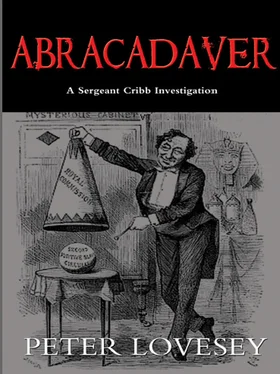
 THERE WAS A TAP at the door of the interview room at Kennington Road Police Station. Sergeant Cribb rubbed his hands in anticipation. ‘It had better be Cadbury’s,’ he told Thackeray. ‘Come in!’
THERE WAS A TAP at the door of the interview room at Kennington Road Police Station. Sergeant Cribb rubbed his hands in anticipation. ‘It had better be Cadbury’s,’ he told Thackeray. ‘Come in!’